Message from Vice Chancellor Hill: On staff excellence
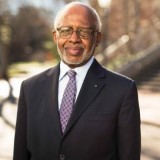
Thank you, staff members. This word – staff – represents thousands of diverse individuals coming to Vanderbilt daily and making a difference in our community. Your invaluable contributions keep the institution functioning. Staff are vital to accomplishing Vanderbilt University’s mission and integral to our success, coming from many backgrounds and experiences and bringing a wealth of excellence to the campus. While faculty normally see students in the classroom, staff members work with students in the dining halls, gym, PCC, library, department offices, residence halls and countless other places.
As our institution moves forward to ensure excellence in equity, diversity and inclusion, the points of view of our staff should be considered at the forefront of the implementation process. We support your contributions and want to elevate your voices as we move forward.
We celebrate our staff’s accomplishments and contributions during the year, both formally and informally, and I have enjoyed meeting many of you while handing out turkeys in the winter and cookies in the summer. Thank you, colleagues, for all that you do. Vanderbilt could not accomplish its goals without you.
George C. Hill, Ph.D.
Distinguished Professor of Molecular Physiology and Biophysics
Professor of Medicine, Health, and Society
Vice Chancellor for Equity, Diversity and Inclusion
Chief Diversity Officer
Vanderbilt University
401 Kirkland Hall
Nashville, TN 37240
Dr.GeorgeHill@vanderbilt.edu
615-343-2644
Welcoming Assistant Vice Chancellor for Equity, Diversity and Inclusion Sandra Barnes, Ph.D.
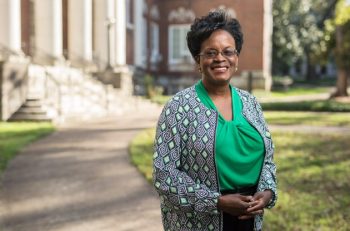
Sandra Barnes, a Vanderbilt sociologist whose work examines resilience and community in urban settings, has been named assistant vice chancellor for equity, diversity and inclusion, Chancellor Nicholas S. Zeppos has announced.
“Sandra’s focus on and experience in empowerment in a variety of communities and her leadership at Vanderbilt made her an ideal candidate to help lead our efforts in diversity, equity and inclusion,” Zeppos said. “I’m honored she has agreed to join the team and look forward to working with her and Vice Chancellor Hill to ensure we are taking thoughtful, effective action to ensure every member of our community is able to thrive.”
Barnes will report directly to Vice Chancellor for Equity, Diversity and Inclusion and Chief Diversity Officer George C. Hill and will work with the chancellor, vice chancellors and other stakeholders to advance equity, diversity and inclusion at Vanderbilt. She will continue to teach and conduct research as a faculty member in the Peabody College Department of Human and Organizational Development and in the Divinity School.
“Through her extensive research and work with churches and communities, Sandra has a clear understanding of the ability of an organization such as Vanderbilt to foster and promote change in attitudes, policies and support systems for a wide variety of underrepresented communities,” Hill said. “She will be a wonderful asset to our work in the EDI office and in helping to implement Chancellor Zeppos’ efforts to improve and support diversity, equity and inclusion.
“Dr. Barnes will also play a key role in helping to articulate the vision and goals of the Office for Equity, Diversity and Inclusion as well as advancing goals articulated in the forthcoming report from the Chancellor’s Committee on Diversity, Inclusion and Community. We look forward to her talented and thoughtful efforts,” Hill said.
Barnes’ responsibilities will include assisting in the development and implementation of goals and objectives for the Office for Equity, Diversity and Inclusion that align with institutional policy and goals. She will work closely with the chancellor and the vice chancellors on strategic initiatives that advance equity and inclusion in the community. She will also be available for listening and information sessions with faculty, staff and students to gather input for the direction of the EDI office.
Barnes, who has a background in statistics, will also analyze data and other evidence related to the university’s progress in equity, diversity and inclusion and is charged with ensuring EDI program development, process improvement and the coordination and integration of processes with other university partners.
Her appointment is effective July 1.
“I am honored to be named to this new role and look forward to working with Chancellor Zeppos, Vice Chancellor Hill, and other university leaders together with students, faculty and staff to support an organizational culture both within and across departments that provides a safe, enriching and inclusive environment for all members of our community,” Barnes said.
Barnes’ research focuses on the role of religion and congregations as change agents in society. She is also interested in race, class and gender dynamics, the relationship between structural constraints and individual agency, and how these dynamics influence the experiences of residents in poor urban spaces. She is the author of seven books and dozens of articles, book chapters and book reviews and has served as lead editor on three edited volumes. In HOD, Barnes was also the faculty chairperson of the Minority Student Committee from 2009-2015 and serves as a member of the Diversity of Views in Education (DOVE) Committee.
She recently completed a one-hour documentary, “Gary, Indiana: A Tale of Two Cities,” examining what churches are doing to empower citizens in an urban space.
Barnes is also principal investigator of a $1.5 million five-year study supported by the Department of Health and Human Services’ Substance Abuse and Mental Health Services studying the troubling trend of disproportionately high HIV diagnoses among young African American males who engage in sexual activity with other men. The study is a unique partnership with First Response Center, a nonprofit HIV/AIDS prevention and care organization run by Metropolitan Interdenominational Church in North Nashville.
Barnes came to Vanderbilt in 2008 after serving as an associate professor of sociology at Case Western Reserve University. She previously served as assistant as well as associate professor in the Department of Sociology and Anthropology and the African American Studies Research Center at Purdue University.
She earned her bachelor of arts degree in mathematics and economics from Fisk University in 1986, and went on to earn a master of science degree in operations research from the Georgia Institute of Technology in 1989. After working as a systems engineer for several years, she found that her true calling, professionally and personally, was to engage in research on the adaptive experiences of historically disenfranchised groups. She returned to school an earned a master of sociology of religion and Christian education in 1995 from the Interdenominational Technological Center in Atlanta, Georgia, and her Ph.D. in sociology from Georgia State University in 1999.
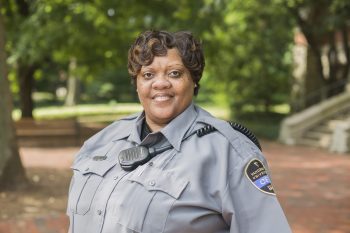
Teresa Anderson has been a Vanderbilt community service officer since March 2014. She is posted at Kirkland Esplanade, one of the university’s main entrances, and is well-known by visitors, students and staff as a friendly face welcoming everyone to campus.
Several people have told us wonderful things about how you make this a safer and more welcoming place. What work do you do to serve our community?
I’m a community service officer, which kind of speaks for itself – I insert myself into the community in all different aspects. It takes a special person to relate to people from all walks of life, and I’ve always been a people person. I love people, so anything I can do to be part of the community, I enjoy.
How did you become interested in the position? Have you always been posted at Kirkland?
When I saw the job posting for community service officer, I liked the sound of it, because I get to work with everyone – college kids, newcomers, visitors. They all stop by my booth to let me know what’s going on. I started out in the hospital handling traffic. I worked in trauma, and then my major and lieutenant at the time recommended me for the post at Kirkland, and here I am.
What is the most rewarding aspect of your work?
I always keep a smile on my face when I greet people, because you never know what problems someone might be having that day. But I can help change their day with a smile and a “How can I help you?” My job is to make sure that while you’re here, you’re comfortable. My mother used to tell me I never met a stranger. And now, it doesn’t really even feel like work.
What are some of the challenges you face in your position?
There’s a lot of focus on police officers in the news these days, and some people are even scared of the police. My challenge is to show people there are good police and community service officers. We do this job to protect people, and we’ll do whatever we need to do to make people safe. I want to make people understand there are good officers out there who are trying to serve our communities the best way we can.
How do CSOs help make this a more inclusive campus for our students, staff, faculty, and visitors?
CSOs are a big part of our customer and community service. We are all over our campus, at the hospital complex and at One Hundred Oaks. We provide services to students, guests, staff and visitors: directions, escorts, jump starts, vehicle access if you lock your keys in the car, and traffic control and parking assistance. We are also a security presence in and around our residence halls and the hospital. We are assigned to key areas to be the eyes and ears of the department. We go just about anywhere in the community. We include everybody, because we’re out here with everybody! The program is expanding because we feel like we’re needed, and that’s a really great feeling.

Chancellor Nicholas S. Zeppos has announced that the university will raise its starting wage to $12.50 an hour and will increase its PTO plan for qualified employees, including adding as holidays the day after Thanksgiving and more than a weeklong winter break. These changes take effect October 1, 2016. The hourly increase will apply to regular, full-time, hourly, nonunion employees, whose current starting rate is $10.88. Under the current PTO plan, employees accrue between 24-34 days a year depending on their length of service, and holidays must be taken from that bank of days. Under the new PTO plan, qualified employees can accrue between 20 and 28 days a year (based on their status and years of service) and also will receive separately 12 paid holidays, for a total of 32-40 days off a year.
University Staff Advisory Council
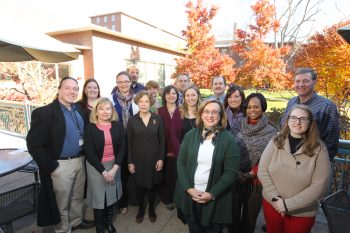
The University Staff Advisory Council is made up of more than 90 elected individuals who represent all nonunion staff members working for Vanderbilt University. USAC is an advisory group to the university’s administration on issues that are important to staff, such as policies, benefits, practices and equity. Many of the council’s suggestions have already been adopted, including short-term disability and free MTA transit.
What makes USAC so valuable is it provides a voice for all staff who may not feel their ideas are being heard. For instance in past USAC’s surveys, many staff expressed concerns with Vanderbilt’s current paid time off (flexPTO) policy. As a result, USAC’s Staff Life committee compared Vanderbilt’s policies with those of peer institutions and composed a new proposal recommending a variety of changes. In the council’s June 2016 meeting, that proposal was unanimously approved and sent to the university administration for consideration.
In addition to its advisory role, USAC is responsible for facilitating communication to the membership’s constituencies on topics like the Employee Appreciation events and promoting council-sponsored activities such as blood drives and food drives. They are also responsible for coordinating volunteers when requests are made for staff participation.
For more information on USAC, including a helpful tool to find your representatives and a comment form to submit your recommendations for future proposals or areas of staff life that need to be addressed, please visit their website.
A conversation with Chief Human Resources Officer Barb Carroll
 We had the opportunity to interview Chief Human Resources Officer Barb Carroll about the role that Human Resources plays in supporting a positive culture of diversity, equity and inclusion on campus. We had the opportunity to interview Chief Human Resources Officer Barb Carroll about the role that Human Resources plays in supporting a positive culture of diversity, equity and inclusion on campus.
You joined Vanderbilt earlier this year as the chief HR officer for the campus. What have been your observations so far?
I also worked at Vanderbilt earlier in my career, and back then, while the medical center was certainly a major presence, it didn’t represent the huge percentage of the total organization to which it had grown over the past couple of decades. I think that proportional change had also impacted the campus ‘dynamics’ to some extent. With the legal transition into two distinct legal entities, we will still collaborate closely with our affiliated medical center, of course. But I think campus faculty and staff are excited to be able refocus on the university’s core academic mission – providing transformative educational experiences to our students and creating important new knowledge for the betterment of society — and to “know again for the first time” the pleasures that come with getting to work on a world-class college campus. This is a special place, and we should be able to feel that every day.
How can an office like Human Resources help support a positive culture on campus?
Universities aren’t much other than the humans who make up the place — the students and the faculty and staff. So I truly believe that people are our most critical strategic asset, and we need to think of them, and value them, as such. I think Human Resources can serve a facilitating role to support great work environments where high quality performance is standard and where people are recognized and valued for that high quality work and dedication. Good people thrive in organizations where they’re both challenged and appreciated, and where they know they are working alongside others with the same commitment and goals in mind. HR can offer support structures that range from good job design and compensation models, to valuable leadership development resources, to helpful communications, to efficient administrative processes that minimize burdens and maximize value. Even in the short time I’ve been here, we’ve been focusing on each of those things, and I hope the campus is already feeling the positive effect of our efforts – with more to come, hopefully.
What are some of the workforce issues that are facing Vanderbilt University – and how might the university address those issues?
For one thing, Vanderbilt has the advantage — and the disadvantage — of being right in the heart of Nashville, and of course, Nashville is an “it” town right now. That means people and businesses are migrating here, which means a potentially bigger employment pool, but also more competitors for top employees. It also means housing costs are rising, especially close to the campus, and commuter traffic is getting worse, which can pose problems for our employees and recruitment challenges for Vanderbilt. We need to make sure we understand our market and have strategies for positioning ourselves as a great employer as well as a great educational institution.
Do you have a philosophy of human resources that guides your work?
My general philosophy is that good organizations should pay well and expect a lot. We want to accomplish great things, and it’s our people who do that. In return for expecting great things, we should have strong HR strategies.
What do you see HR being able to do to foster greater diversity, inclusion and equity at Vanderbilt University?
We can collaborate with the Office of Equity, Diversity and Inclusion on programmatic initiatives that support diversity and inclusion. We can work with hiring managers to help ensure that they have diverse pools of well-qualified candidates. We can help ensure that managers look at the diversity profiles and characteristics of their faculty and staff populations as they make personnel decisions. We can try to offer benefits and compensation programs that attract strong and diverse candidates at all levels of the organization — such as the announcements this week that we are enhancing the starting wages for entry-level staff and the PTO plan for all staff.
Rammadan and Eid-al-Fitr: A staff perspective
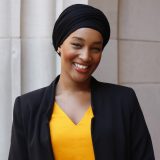 By Kehsi Iman Wilson (she, her, hers) By Kehsi Iman Wilson (she, her, hers)
Program coordinator, Inclusion Initiatives and Cultural Competence, Office of the Dean of Students
The significance of Ramadan, like one’s relationship with God, is largely personal. Ramadan for me is a time of cleansing, of renewing, of restoring. The religious significance of Ramadan in Islam is that it is the month that the Holy Quran — the Holy Book that we consider the final revelation after the Taurat (Torah of Moses) and Injeel (The Gospel of Jesus Christ) — was revealed to the Prophet Muhammad. I take advantage of this month to focus in on personal goals I have such as meditating daily, increasing patience, preparing for major life events, and standing in the gap for others. It is declared in the Quran, Surah (like a book in the Bible) Al-Baqarat 2:183-184:
“O believers! Fasting is prescribed for you as it was prescribed for those before you (Christians and Jews), so that you may become pious. Fast the prescribed number of days; except if any of you is ill or on a journey, then fast a similar number of days later. For those who cannot endure it for medical reasons, there is a ransom; the feeding of one poor person for each missed day. Whoever does more good than this voluntarily, it is better for him. However, if you truly understand the rationale for fasting, it is better for you to fast.”
It continues in verse 185:
“It is the month of Ramadan in which the Quran was revealed, a guidance for mankind with clear teachings showing the Right Way and a criterion of truth and falsehood.”
There are many themes visible in these verses, most notably the revelation of the Quran and the centrality of service. Ramadan is often mistakenly referred to by Muslims and non-Muslims alike as “the month of fasting.” Though the fast is important (we fast from sunup to sundown), in fact, the significance of the month is not the fast (everyone does that! See above) but the revelation of the Holy Book. For this reason, all Muslims are encouraged to read the entire Quran during the month, reflecting on it, appreciating it, and allowing its truth to penetrate our hearts and minds and improve our lives. In all of the Abrahamic faith traditions, fasting is upheld as a time to subjugate the physical self for the purpose of emphasizing the spiritual self.
Ramadan is also a time of solidarity with those around the world who struggle with starvation or otherwise do not have sufficient food or drink. This is where service comes in. It is believed that good deeds done in the month of Ramadan receive exponential reward. Many Muslims take advantage of this to do more good by serving their communities, feeding the hungry, volunteering at shelters and soup kitchens, preparing community potlucks, and nurturing and cultivating their relationships with community members of all faiths. Ramadan is also a major party time in the Islamic community, marked by suhoor (the predawn meal) and elaborate iftar (evening meal) parties that go late into the night (or overnight). Families cook and prepare for months in advance all of the fun and food that will be a part of the daily celebrations. Eid-al-Fitr is the culmination of the month. It is time of celebration and coming together as an ummah (community of believers) to celebrate all that has been accomplished during the month.
I look forward to experiencing new revelations about my faith from the Quran as well as the opportunity to get together with friends and family who are also working toward their own spiritual growth. We support each other, encourage each other (especially during very hot days when the stomach won’t keep quiet), and celebrate with each other. One of my non-Muslim friends is hosting a Mexican-themed iftar party for me this year. My sister does her own modified fast where she gives up media and bad habits. Another non-Muslim friend of mine is “fasting” in solidarity with me by only drinking juices during the day. This gets to the heart of Ramadan: bridge-building and coming together in service, solidarity and love.
Employee Appreciation Picnic celebrates staff and faculty contributions
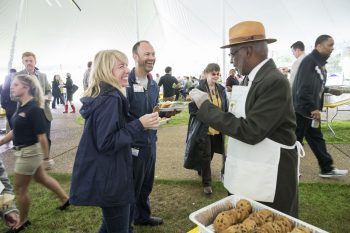
Vanderbilt’s Employee Appreciation Picnic is a longstanding tradition to recognize and thank staff and faculty for their efforts and contributions to the university’s success. Employees from both the campus and the medical center were invited. Since 2011, HR has planned the event with both day and night serving times to accommodate staff who work different shifts.
Work/Life Connections-EAP
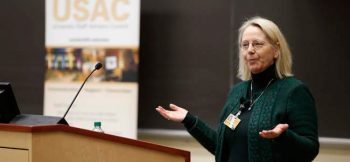
Work/Life Connections-EAP (Employee Assistance Program) provides performance coaching aimed at enhancing productivity and effectiveness, brief solution-focused counseling and resource information that helps employees address acute life stressors, and management consultation that serves to guide supervisors in handling employees and difficult workplace situations. The department also offers departmental trainings to build personal and professional resilience. In addition, when a traumatic incident (such as the death of a co-worker, a threat to the personal safety of the staff or other stressful event) impacts the emotional well-being of the Vanderbilt community, Work/Life Connections-EAP is available to help.
Located in the basement of the Medical Arts Building, Work/Life Connections-EAP offers free and confidential services to employees and their spouses or same-sex domestic partners. Please call 615-936-1327 to schedule an initial assessment appointment to determine what service best meets your needs.
HR Diversity Committee continues awareness, education efforts
Over the past four years, Vanderbilt Human Resources has expanded its own awareness of and commitment to diversity and inclusion at the university through activities and events organized by its internal D&I committee. HR staff have participated in events ranging from webinars, TED talks, and book discussions to lunch and learns with diverse speakers and panels, parades and festivals, and other community events.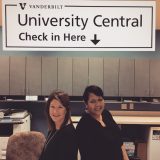
Following the university’s separation from the Medical Center, a new D&I committee was created to continue this work within the HR division. Its first effort was to create a mission statement: We aspire to create an inclusive work environment in Vanderbilt Human Resources through information, education, and dialogue. We value, respect and support ideas that will enable HR staff to bring their best selves to work. We will use these efforts to model inclusive excellence in our work interactions with the Vanderbilt community.
The committee meets every other week and plans to restart department-wide activities in August.
| ![EDI Matters Newsletter E-Newsletter [Vanderbilt University]](https://cdn.vanderbilt.edu/vu-URL/wp-content/uploads/sites/119/2019/03/19152622/EDIMatter600.jpg)





 We had the opportunity to interview Chief Human Resources Officer Barb Carroll about the role that Human Resources plays in supporting a positive culture of diversity, equity and inclusion on campus.
We had the opportunity to interview Chief Human Resources Officer Barb Carroll about the role that Human Resources plays in supporting a positive culture of diversity, equity and inclusion on campus. By Kehsi Iman Wilson (she, her, hers)
By Kehsi Iman Wilson (she, her, hers)




